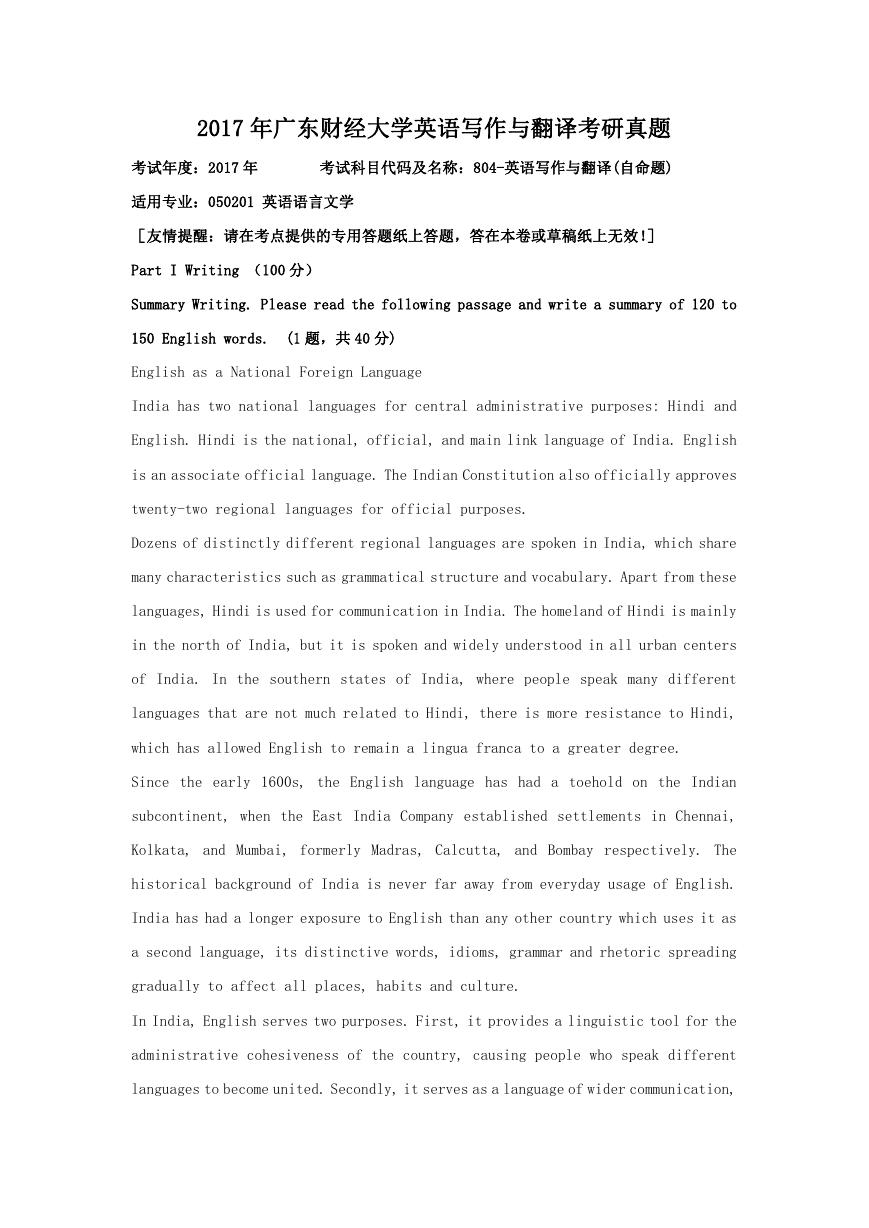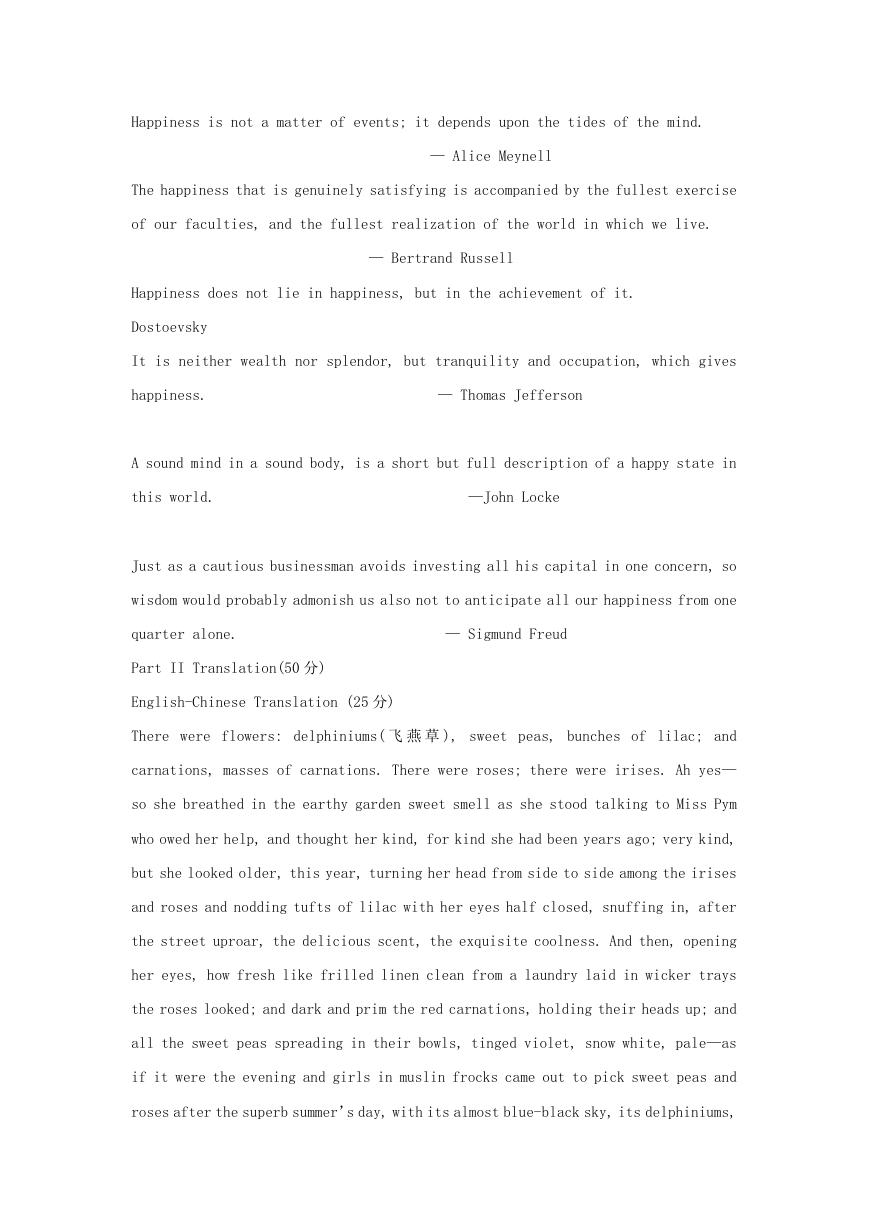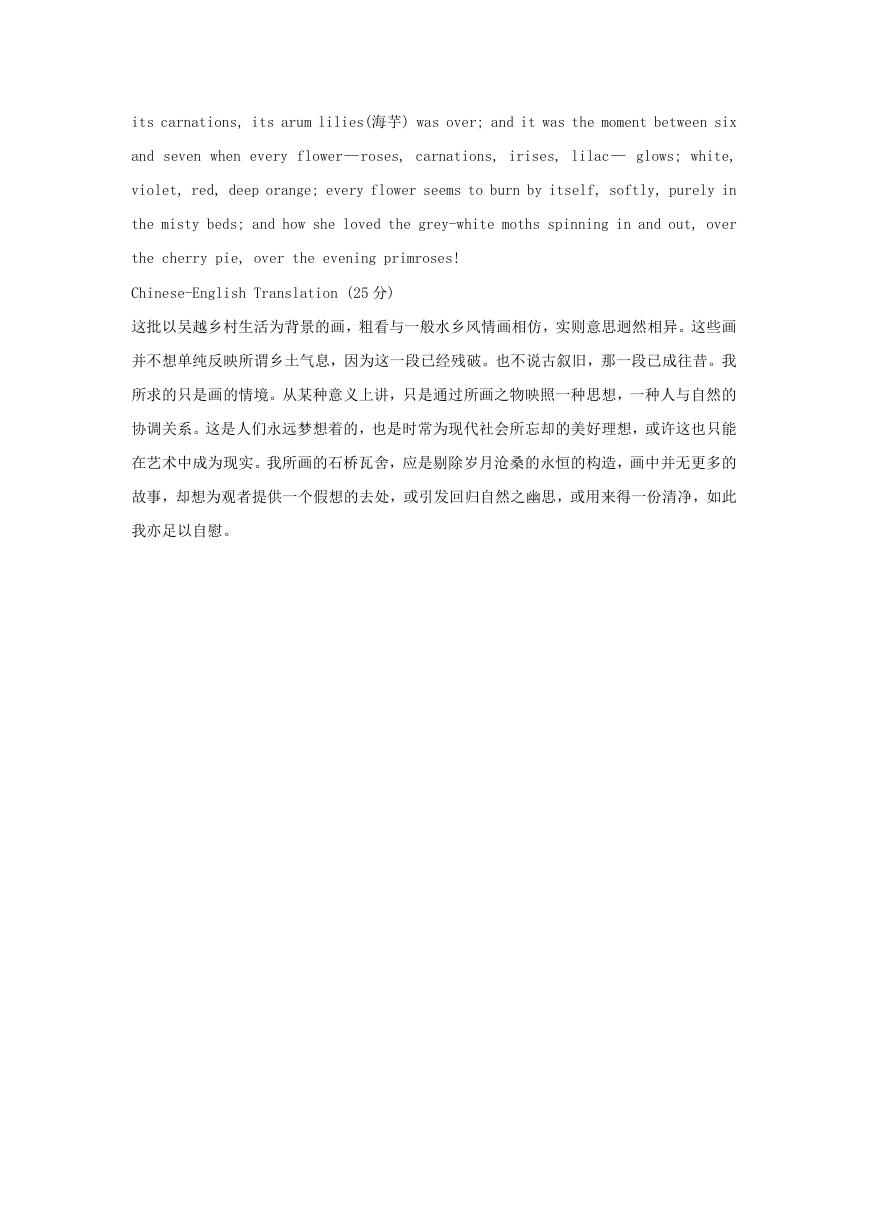2017 年广东财经大学英语写作与翻译考研真题
考试年度:2017 年
考试科目代码及名称:804-英语写作与翻译(自命题)
适用专业:050201 英语语言文学
[友情提醒:请在考点提供的专用答题纸上答题,答在本卷或草稿纸上无效!]
Part I Writing (100 分)
Summary Writing. Please read the following passage and write a summary of 120 to
150 English words.
(1 题,共 40 分)
English as a National Foreign Language
India has two national languages for central administrative purposes: Hindi and
English. Hindi is the national, official, and main link language of India. English
is an associate official language. The Indian Constitution also officially approves
twenty-two regional languages for official purposes.
Dozens of distinctly different regional languages are spoken in India, which share
many characteristics such as grammatical structure and vocabulary. Apart from these
languages, Hindi is used for communication in India. The homeland of Hindi is mainly
in the north of India, but it is spoken and widely understood in all urban centers
of India. In the southern states of India, where people speak many different
languages that are not much related to Hindi, there is more resistance to Hindi,
which has allowed English to remain a lingua franca to a greater degree.
Since the early 1600s, the English language has had a toehold on the Indian
subcontinent, when the East India Company established settlements in Chennai,
Kolkata, and Mumbai, formerly Madras, Calcutta, and Bombay respectively. The
historical background of India is never far away from everyday usage of English.
India has had a longer exposure to English than any other country which uses it as
a second language, its distinctive words, idioms, grammar and rhetoric spreading
gradually to affect all places, habits and culture.
In India, English serves two purposes. First, it provides a linguistic tool for the
administrative cohesiveness of the country, causing people who speak different
languages to become united. Secondly, it serves as a language of wider communication,
�
including a large variety of different people covering a vast area. It overlaps with
local languages in certain spheres of influence and in public domains.
Generally, English is used among Indians as a ‘link’ language and it is the first
language for many well-educated Indians. It is also the second language for many
who speak more than one language in India. The English language is a tie that helps
bind the many segments of our society together. Also, it is a linguistic bridge
between the major countries of the world and India.
English has special national status in India. It has a special place in the parliament,
judiciary, broadcasting, journalism, and in the education system. One can see a
Hindi-speaking teacher giving their students instructions during an educational
tour about where to meet and when their bus would leave, but all in English. It means
that the language permeates daily life. It is unavoidable and is always expected,
especially in the cities.
The importance of the ability to speak or write English has recently increased
significantly because English has become the de facto standard. Learning English
language has become popular for business, commerce and cultural reasons and
especially for internet communications throughout the world. English is a language
that has become a standard not because it has been approved by any ‘standards’
organization but because it is widely used by many information and technology
industries and recognized as being standard. The call centre phenomenon has
stimulated a huge expansion of internet-related activity, establishing the future
of India as a cyber-technological super-power. Modern communications, videos,
journals and newspapers on the internet use English and have made ‘knowing English’
indispensable.
Essay Writing. Please write an essay around 500 English words according to the
materials given below.
(1 题,60 分)
Happiness is what human beings pursue during their lives. But what is the real
happiness in this world? Read the following quotations, and write an essay on
HAPPINESS, explicating your opinions with examples. Make your essay logical, concise
and convincing. You should give a title to your essay.
�
Happiness is not a matter of events; it depends upon the tides of the mind.
— Alice Meynell
The happiness that is genuinely satisfying is accompanied by the fullest exercise
of our faculties, and the fullest realization of the world in which we live.
Happiness does not lie in happiness, but in the achievement of it.
— Bertrand Russell
Dostoevsky
It is neither wealth nor splendor, but tranquility and occupation, which gives
happiness.
— Thomas Jefferson
A sound mind in a sound body, is a short but full description of a happy state in
this world.
—John Locke
Just as a cautious businessman avoids investing all his capital in one concern, so
wisdom would probably admonish us also not to anticipate all our happiness from one
quarter alone.
— Sigmund Freud
Part II Translation(50 分)
English-Chinese Translation (25 分)
There were flowers: delphiniums( 飞 燕 草 ), sweet peas, bunches of lilac; and
carnations, masses of carnations. There were roses; there were irises. Ah yes—
so she breathed in the earthy garden sweet smell as she stood talking to Miss Pym
who owed her help, and thought her kind, for kind she had been years ago; very kind,
but she looked older, this year, turning her head from side to side among the irises
and roses and nodding tufts of lilac with her eyes half closed, snuffing in, after
the street uproar, the delicious scent, the exquisite coolness. And then, opening
her eyes, how fresh like frilled linen clean from a laundry laid in wicker trays
the roses looked; and dark and prim the red carnations, holding their heads up; and
all the sweet peas spreading in their bowls, tinged violet, snow white, pale—as
if it were the evening and girls in muslin frocks came out to pick sweet peas and
roses after the superb summer’s day, with its almost blue-black sky, its delphiniums,
�
its carnations, its arum lilies(海芋) was over; and it was the moment between six
and seven when every flower—roses, carnations, irises, lilac— glows; white,
violet, red, deep orange; every flower seems to burn by itself, softly, purely in
the misty beds; and how she loved the grey-white moths spinning in and out, over
the cherry pie, over the evening primroses!
Chinese-English Translation (25 分)
这批以吴越乡村生活为背景的画,粗看与一般水乡风情画相仿,实则意思迥然相异。这些画
并不想单纯反映所谓乡土气息,因为这一段已经残破。也不说古叙旧,那一段已成往昔。我
所求的只是画的情境。从某种意义上讲,只是通过所画之物映照一种思想,一种人与自然的
协调关系。这是人们永远梦想着的,也是时常为现代社会所忘却的美好理想,或许这也只能
在艺术中成为现实。我所画的石桥瓦舍,应是剔除岁月沧桑的永恒的构造,画中并无更多的
故事,却想为观者提供一个假想的去处,或引发回归自然之幽思,或用来得一份清净,如此
我亦足以自慰。
�








 2023年江西萍乡中考道德与法治真题及答案.doc
2023年江西萍乡中考道德与法治真题及答案.doc 2012年重庆南川中考生物真题及答案.doc
2012年重庆南川中考生物真题及答案.doc 2013年江西师范大学地理学综合及文艺理论基础考研真题.doc
2013年江西师范大学地理学综合及文艺理论基础考研真题.doc 2020年四川甘孜小升初语文真题及答案I卷.doc
2020年四川甘孜小升初语文真题及答案I卷.doc 2020年注册岩土工程师专业基础考试真题及答案.doc
2020年注册岩土工程师专业基础考试真题及答案.doc 2023-2024学年福建省厦门市九年级上学期数学月考试题及答案.doc
2023-2024学年福建省厦门市九年级上学期数学月考试题及答案.doc 2021-2022学年辽宁省沈阳市大东区九年级上学期语文期末试题及答案.doc
2021-2022学年辽宁省沈阳市大东区九年级上学期语文期末试题及答案.doc 2022-2023学年北京东城区初三第一学期物理期末试卷及答案.doc
2022-2023学年北京东城区初三第一学期物理期末试卷及答案.doc 2018上半年江西教师资格初中地理学科知识与教学能力真题及答案.doc
2018上半年江西教师资格初中地理学科知识与教学能力真题及答案.doc 2012年河北国家公务员申论考试真题及答案-省级.doc
2012年河北国家公务员申论考试真题及答案-省级.doc 2020-2021学年江苏省扬州市江都区邵樊片九年级上学期数学第一次质量检测试题及答案.doc
2020-2021学年江苏省扬州市江都区邵樊片九年级上学期数学第一次质量检测试题及答案.doc 2022下半年黑龙江教师资格证中学综合素质真题及答案.doc
2022下半年黑龙江教师资格证中学综合素质真题及答案.doc